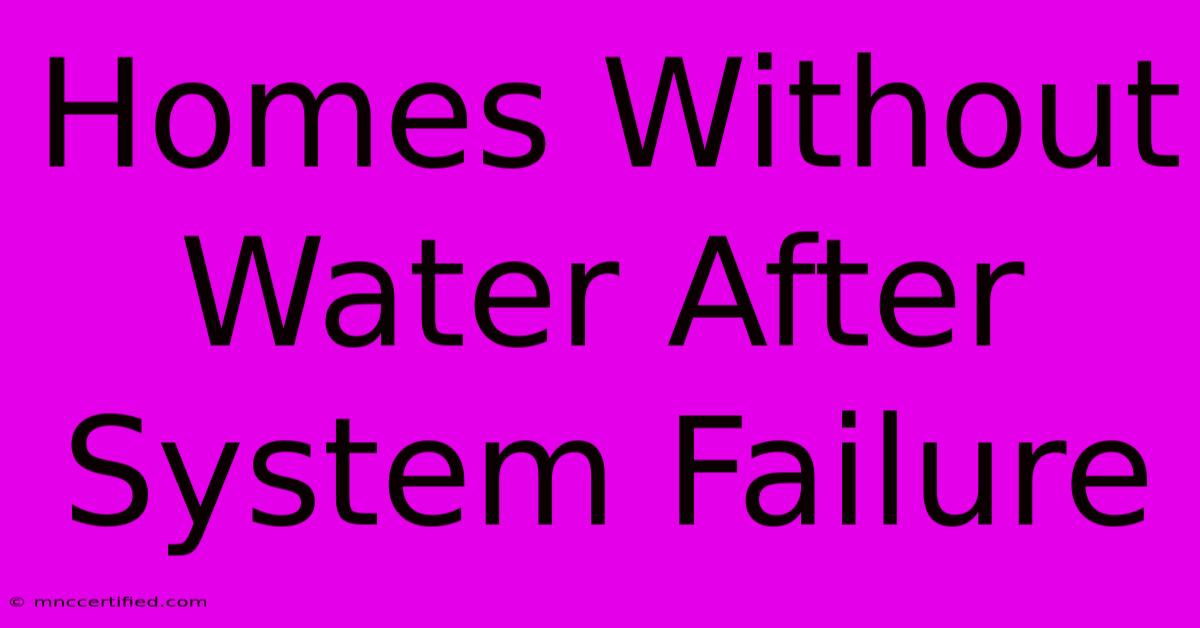Homes Without Water After System Failure

Table of Contents
Homes Without Water After System Failure: A Guide to Coping and Prevention
Millions of homeowners experience the sudden disruption of water service each year due to system failures. This isn't just an inconvenience; it can be a major crisis, impacting daily life, hygiene, and even property safety. This comprehensive guide explores the causes of water system failures, how to cope with a water outage, and importantly, steps you can take to prevent future disruptions.
Understanding Water System Failures: Causes and Consequences
Water system failures can stem from a variety of sources, both predictable and unexpected. Understanding these causes can help you better prepare and potentially prevent future issues.
Common Causes of Water Outages:
- Main Breaks: These are often caused by aging infrastructure, extreme weather conditions (freezing temperatures, heavy rains), or accidental damage from construction or other activities. Main breaks are a frequent culprit in widespread water outages.
- Equipment Malfunctions: Problems with pumps, valves, or other crucial components of the water distribution system can lead to disruptions. Regular maintenance is crucial to prevent these equipment malfunctions.
- Power Outages: Many water treatment plants and pumping stations rely on electricity. Extended power outages can severely impact water supply.
- Contamination: If harmful substances contaminate the water supply, the system may be shut down to prevent illness. This is a serious issue requiring immediate action and careful water testing once service is restored.
- Planned Maintenance: While less disruptive, planned maintenance can still result in temporary water outages. Your local water utility will typically provide advance notice of such planned maintenance.
- Natural Disasters: Floods, hurricanes, and earthquakes can severely damage water infrastructure, resulting in extensive and prolonged water outages. Natural disaster preparedness is essential in areas prone to such events.
Consequences of Water Outages:
Beyond the inconvenience of not having running water, the consequences can be far-reaching:
- Health Concerns: Lack of access to clean water can lead to poor hygiene, increasing the risk of illness.
- Property Damage: Prolonged water outages can cause damage to pipes (due to freezing), appliances, and even structural damage.
- Economic Impact: Businesses and homes may experience significant financial losses due to disruptions in operations.
- Community Disruption: Widespread outages can significantly impact entire communities, affecting schools, hospitals, and other essential services.
Coping with a Water Outage: Practical Steps
When faced with a water outage, acting quickly and decisively is crucial.
Immediate Actions:
- Conserve Water: Use existing water sparingly. Avoid flushing toilets unnecessarily.
- Check with Neighbors and Local Authorities: Confirm if the outage is widespread or isolated to your property. Contact your local water utility for updates.
- Gather Emergency Water Supplies: Have enough potable water stored for drinking, cooking, and hygiene. Aim for at least one gallon per person per day.
- Locate Alternative Water Sources: If safe, consider using water from a well or a trusted neighbor's supply.
- Protect Your Property: Take measures to prevent frozen pipes if temperatures are low.
Longer-Term Strategies:
- Stay Informed: Monitor news reports and official updates from your water utility.
- Practice Water Conservation: Even when water service is restored, adopt water-saving habits to reduce your overall consumption.
- Consider a Water Storage Tank: Investing in a water storage tank can provide a backup supply during outages.
Preventing Future Water Outages: Proactive Measures
While you can't control every aspect of your water system, taking proactive steps can significantly reduce your risk of future outages.
Homeowner Responsibilities:
- Regular Pipe Inspection: Check for leaks and signs of damage to your plumbing system. Address issues promptly to prevent escalating problems.
- Insulate Pipes: Insulate exposed pipes to prevent freezing during cold weather.
- Maintain Your Water Heater: Regular maintenance helps prevent malfunctions that can impact water pressure.
- Know Your Water Meter: Understand how to locate and read your water meter. This can help you detect leaks or unusual water usage.
Community Engagement:
- Advocate for Infrastructure Improvements: Support initiatives that improve water infrastructure in your community.
- Report Leaks and Issues Promptly: Contact your water utility immediately if you notice leaks, low water pressure, or other issues.
By understanding the causes of water system failures, preparing for outages, and implementing preventive measures, homeowners can significantly reduce their vulnerability and ensure a more reliable water supply. Remember, being prepared is the best defense against the disruption and inconvenience of a water outage.

Thank you for visiting our website wich cover about Homes Without Water After System Failure. We hope the information provided has been useful to you. Feel free to contact us if you have any questions or need further assistance. See you next time and dont miss to bookmark.
Featured Posts
-
600 M Adidas Deal For Lillard
Dec 19, 2024
-
Yorkshire Vet Christmas Eve Harrogate
Dec 19, 2024
-
Eddie Stobart Obituary And Life
Dec 19, 2024
-
Grace Dent For Celebrity Master Chef
Dec 19, 2024
-
Perez Out Lawson In At Red Bull
Dec 19, 2024